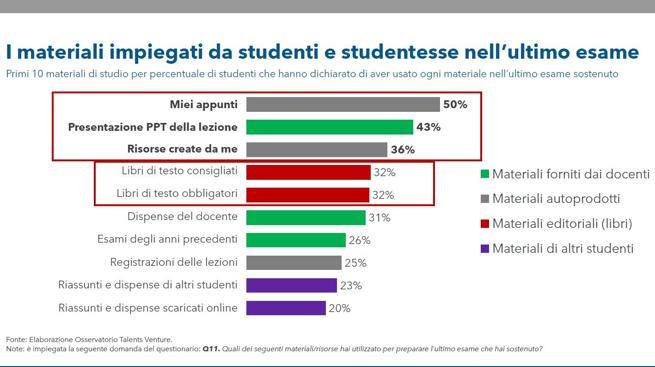Knowledge is not just an accumulation of information, it is a process of building connections of meaning. What happens, then, if the reasoning behind a concept is reduced to a few lines annotated in a notebook? In practice, if one learns thermodynamics, 19th-century revolutions, and heart pathologies through sparse notes and diagrams, how does knowledge change? What impact will there be on future society?
These are legitimate questions in light of the findings of a recent study. The study, conducted last summer on a sample of one thousand university students aged 19 to 30, revealed that nearly 60% of them who prepared for their last exam using both textbooks (especially at the request of the professor) and digital exercises, also supplemented their study materials with those suggested by their professors (78%), such as academic articles, slides, handouts, and quizzes. A similar percentage of interviewees (71%) also used self-produced materials in combination with the textbook, including notes (in over half of the cases), recorded lectures, and concept maps. To a lesser extent (54%), students used notes from other students and summaries found online.
There is a constant need to simplify textbooks. For instance, medical textbooks twenty years ago typically had a minimum of 700 pages, whereas today they have about half that number, according to Messina. The habit of learning with faster and more superficial tools is a shortcut that can risk being maintained beyond university, resulting in less critical and decision-making skills when facing other situations. However, Messina emphasizes that notes are a valuable source of enrichment but cannot replace the in-depth study of a book.
Additionally, about eight out of ten students prefer paper books, and one in three students who choose the digital version still print it in whole or in part for various reasons. This preference for paper books may be attributed to their perceived benefits in aiding concentration and better memorization, while digital books are favored for reasons of environmental sustainability, accessibility from anywhere, and ease of transport. In summary, the shift towards exclusively light study resources may lead to a fragile knowledge geared solely towards passing exams, potentially resulting in a loss of competence in the workforce and a weakening of the ability to understand complex texts and analyze problems. This trend could have detrimental effects on both individuals and society as a whole.
